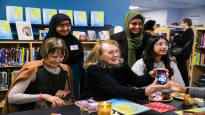Annie Ernaux, winner of the Nobel Prize for Literature, continued the more than 30-year-old tradition and visited schoolchildren from Stockholm’s immigrant neighborhoods. The meeting was unforgettable for both the Nobel laureate and the students.
12.12. 21:00•Updated 12.12. 21:04
STOCKHOLM It was half past ten in the morning and I was ten years old Abdulkadir Vural doesn’t want to stay on the bench.
– Extremely exciting, I have butterflies in my stomach, I’m terribly nervous.
The excitement was caused by the fact that a Nobel laureate would soon come to Rinkeby’s library Annie Ernaux. A real Nobel laureate!
And Abdulkadir should in turn welcome the Nobel laureate in literature to Rinkebyhy in his own mother tongue, i.e. Turkish. It was exciting.
But the meeting between the French Nobel laureate and the students of the three schools in Tensta and Rinkeby was unforgettable for everyone.
The students have been studying Alfred Nobel all autumn and knew about his wealth, sorrows and childlessness.
The last few weeks of the Nobel studies have been focused on the books of this year’s Nobel laureate in literature, Ernaux.
– His books are so interesting. When I open the book, I just want to read more, says the 9th grader Kowsar Nur.
– They touch many women. I think they are good. I recommend his books to everyone, says the same age Kevin Berwari.
The following Nobel laureates from Rinkeby
The Nobelist’s visit to the Rinkeby library has a long tradition. For the first time, the children of the immigrant neighborhood met the Nobel laureate in literature already in 1988.
Author Gunilla Lundgren are the mothers of the idea and are still involved. Lundgren says that he heard that the Nobel laureates call each other that “Don’t miss Rinkeby”. And the vast majority of literature prize winners have followed the advice and come to meet the students.
Even now, Rinkeby and the neighboring neighborhood are on the Swedish police’s list of especially troublesome neighborhoods. There were a lot of immigrant families in the 80s and there are now.
-I always say that you are the children of the future. You are multilingual, you know how to live with different cultures and religions. We need people like you.
– Many Nobel laureates are just like you, know many languages and have lived and written their masterpieces in exile. That’s how you can get the Nobel Prize. And it’s not just my invention, Gunilla Lundgren says.
Ernaux’s most important appointment
Nevin Berwari is in the ninth grade and was about to host a meeting with Ernaux.
– This makes us feel important. Only negative things are written about Rinkeby and Tensta, although there are many good things here. Yes, this strengthens our self-esteem.
Annie Ernaux said that she herself lives in a multicultural city and the students had enough to ask. The writer was in no hurry and there were many students who wanted to talk.
Ernaux described the meeting with schoolchildren as the highlight of his Nobel week.
– I think this was perhaps the most important of my encounters. And I think it was for them too.
– When the children on stage told about their parents, it was very touching for me. It was like an answer to my books.
– Behind the years and different circumstances, I recognize something of my own emigration in French culture, Ernaux answered ‘s question.
